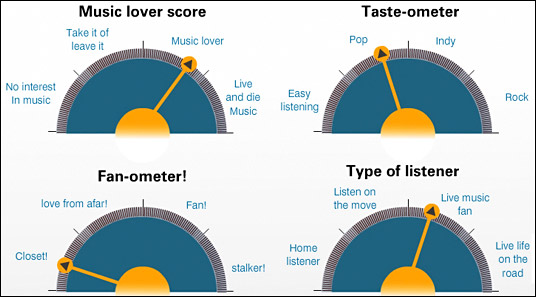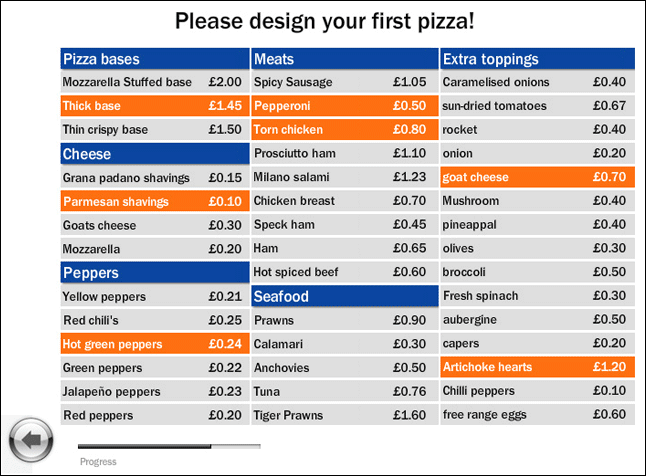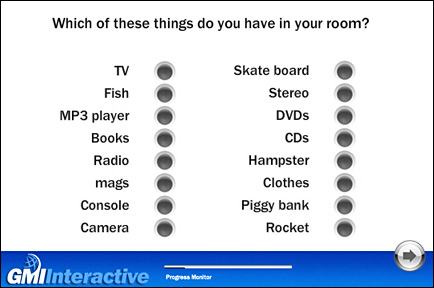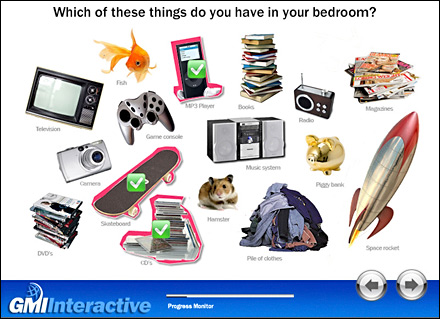 |
Jon Puleston
Jon is Vice President of GMI Interactive, part of the GMI group based in London. GMI (Global Market Insite, Inc.) is an online research and technology provider headquartered in Seattle, USA. His team specialises in the design of interactive surveys and developing specialist technology for conducting interactive online research.
Read the full biography here. |
Game Theory
turning surveys into games
21st March, 2011
Gamification is clearly a bit of a buzzword in the marketing industry right now and a subject of growing interest amongst market researchers - this article looks at the work we have been doing to explore the role of game play in online surveys.
Background
For the last 3 years we have been on a quest to find ways to improve online surveys by making them more engaging for respondents, conducting over 100 experiments looking at different techniques. Over the course of this work, we observed how impactful introducing any level of playfulness or game-style activity in an online survey could be at stimulating extra feedback.
I would go as far as saying that you could single out game play as the single most effective means of engaging with respondents we have discovered.
As a result, we began last year to take a serious look at how we could introduce more game-like activities into surveys and researching the impact this had.
For those that are not already tuned in to survey Gamification techniques, here is a short summary of what we have learnt so far.
1. Reframing questions to be more game-like:
A game is really anything we do that involves thinking that is fun. What differentiates a game from a survey question really boils down to how we ask it. Take this example:
Question: 'what is your favourite meal'
Game: 'Imagine you are on death row, what would you order for your last meal'
By asking the question in a more imaginary framework it becomes more fun for respondents to answer and in turn we have found respondents then deliver far richer responses. (see examples below)

2. Adding a competitive element:
Most games have a competitive element and it is amazing the impact that adding any form of competitive activity to a survey can have.
The simple phrase “We challenge you...” added to a question asking people to recall something can easily double the volume of responses. Other phrases like “can you guess...” or “you have 1 minute...” seem to be equally powerful.
Question: 'what brands do you recall'
Game: 'can you guess the top 5 brands, you have 2 minutes..'
This shift in emphasis not only improves response, in the above case delivering 4 times as many brand names, we see how it also improves enjoyment levels, highlighting the direct relationship between fun and effort.
3. Reward and feedback mechanisms:
A typical survey contains no form of feedback or reward for successful performance, except a somewhat distant financial incentive. Yet you only have to look at the success of psychometric test-style games flying around Facebook to understand the power of a reward/feedback mechanic.
Question: 'what is your favourite colour'
Game: 'Find out what your favourite colour says about you!'
Reward and feedback mechanisms are extremely easy conceptually to integrate into surveys and we are working with several clients developing these right now. The issue really is in adapting your survey technology to handle scoring and feedback mechanics effectively. This is something we have been focusing on from a technical point of view and now offer a scoring component that can be integrated into any survey.

4. Understanding that we enjoy thinking:
Many of the games we most enjoy involve quite complex thinking: take chess or Scrabble or most computer games as examples. Yet many surveys simply do not have any expectations for people to think at all. Conjoint research is a perfect example of this, a mind-numbingly dull task for the respondent. We have played around with transposing traditional conjoint research to more complex product building games and the impact is dramatic, delivering far more creative solutions to the extent that we are now building a full product offering using this particular game play technique called “Evolution: survival of the fittest product”.
Question: 'would you prefer a 10’ thick base pizza, or 12’ thin base'
Game: 'Who can make the most popular pizza from these ingredients'

5. We play games with other people:
Playing within a group, or as part of a team, brings the potential for collective spirit, which can engage greater effort and increase desire to complete a task effectively.
Clearly, this is much harder to realize in an online environment, as we complete a survey as an individual.
But not impossible. The idea we are exploring right now is to create a series of surveys and allocate respondents into teams who then compete against each other to complete a series of tasks. We are doing some experiments to see how this works, but the technique of using team based game play I already know is being employed extremely successfully in focus group by Arthur Fletcher & Blauw Research.
Question: 'what is your solution'
Game: 'Can your team come up with the best solution'
6. “Gamifying” questions:
Working from these initial ideas, we have explored how to redesign conventional question formats, such as text input, word selectors and grid questions, to make them more playful and game-like in character and are building a suite of more game style question formats into our survey technology.
Question:

Game:

Some of these new question techniques are still under wraps while we are testing them out, but we hope to soon understand the impact that they can have on how respondents answer.
7. Turning whole surveys into games:
The final thoughts are on more holistic approaches to game play. I think the field is open here to a wide range of ideas.
The most successful we have found of doing this so far has been to employ projection techniques, such as asking respondents to imagine they are the boss of a company.
Question: 'what do you think of this new product idea'
Game: 'Imagine you are the judge on a new TV game show called New Product Factors'

This technique we have found can result in 3 times as many thoughts and ideas from respondents.
In summary:
The basic idea behind game theory as applied to market research is that respondents who perceive a survey as an enjoyable game-like activity are much more likely to devote effort and thought to its completion, and thus give more valuable answers.
Game thinking is really as much of a mindset about engaging respondents as it is about the specifics of the methodology or about designing wacky questions.
I believe that nearly any question in a survey could be made more fun and game-like to answer with enough thought and imagination and I predict we will see whole new game style survey mechanics emerging in the future.
We are currently working with Engage research and three end-user clients to explore ways of making whole surveys more game-like and we are also looking at how these gaming techniques impact on the character of answers, an important question for many people. We hope to reveal the results of all this research in a paper we are intending to publish later this year.

Jon Puleston
Comments on this article

Want to share your thoughts...?
Jon, nice read and interesting findings. Wondering if you had differences in age groups. Or if you were able to track this in time, to see how fatigue on this works. And a lot more I wonder about :-) Would be happy to learn more about it!
Sam
NOTE: Please note that this board is moderated, and comments are published at the discretion of the site owner.
|